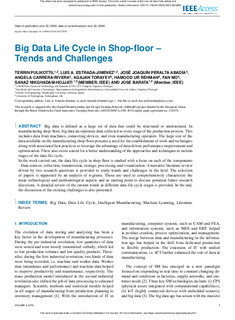Izenburua
Big Data Life Cycle in Shop-floor. Trends and ChallengesEgilea (beste erakunde batekoa)
Beste instituzio
Universidade Nova de LisboaUniversity of Nottingham
Bertsioa
Bertsio argitaratua
Eskubideak
© 2023 The AuthorsSarbidea
Sarbide irekiaArgitaratzailearen bertsioa
https://doi.org/10.1109/ACCESS.2023.3253286Non argitaratua
IEEE Access Vol. 11Argitaratzailea
IEEEGako-hitzak
Big Data
Soft sensors
Market research
Data communication ... [+]
Soft sensors
Market research
Data communication ... [+]
Big Data
Soft sensors
Market research
Data communication
Solid modeling
Real-time systems
Machine learning [-]
Soft sensors
Market research
Data communication
Solid modeling
Real-time systems
Machine learning [-]
Laburpena
Big data is defined as a large set of data that could be structured or unstructured. In manufacturing shop-floor, big data incorporates data collected at every stage of the production process. This in ... [+]
Big data is defined as a large set of data that could be structured or unstructured. In manufacturing shop-floor, big data incorporates data collected at every stage of the production process. This includes data from machines, connecting devices, and even manufacturing operators. The large size of the data available on the manufacturing shop-floor presents a need for the establishment of tools and techniques along with associated best practices to leverage the advantage of data-driven performance improvement and optimization. There also exists a need for a better understanding of the approaches and techniques at various stages of the data life cycle. In the work carried out, the data life-cycle in shop-floor is studied with a focus on each of the components - Data sources, collection, transmission, storage, processing, and visualization. A narrative literature review driven by two research questions is provided to study trends and challenges in the field. The selection of papers is supported by an analysis of n-grams. Those are used to comprehensively characterize the main technological and methodological aspects and as starting point to discuss potential future research directions. A detailed review of the current trends in different data life cycle stages is provided. In the end, the discussion of the existing challenges is also presented. [-]
Sponsorship
Comisión EuropeaProjectu ID
info:eu-repo/grantAgreement/EC/H2020/814078/EU/Digital Manufacturing and Design Training Network/DiManDBildumak
Item honek honako baimen-fitxategi hauek dauzka asoziatuta:























